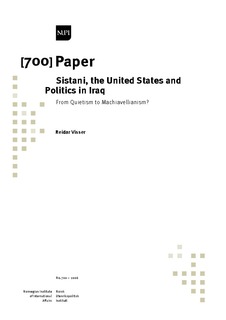| dc.contributor.author | Visser, Reidar | |
| dc.date.accessioned | 2016-07-01T14:16:52Z | |
| dc.date.accessioned | 2016-07-04T09:17:05Z | |
| dc.date.available | 2016-07-01T14:16:52Z | |
| dc.date.available | 2016-07-04T09:17:05Z | |
| dc.date.issued | 2006 | |
| dc.identifier.citation | Working Paper, NUPI nr 700. NUPI, 2006 | nb_NO |
| dc.identifier.isbn | 82 7002 129 6 | |
| dc.identifier.issn | 0800 - 0018 | |
| dc.identifier.uri | http://hdl.handle.net/11250/2395442 | |
| dc.description | - | nb_NO |
| dc.description.abstract | This paper discusses the two prevailing interpretations of the political attitudes
of the Grand Ayatollah Ali al-Sistani, the leading Shiite cleric in Iraq today. It is argued that
neither the traditional “quietist” paradigm nor more recent Machiavellian interpretations can
satisfactorily explain Sistani’s actions. An alternative interpretation is offered which highlights
Sistani’s historical oscillation between passive and activist positions. It is suggested
that, after an activist intermezzo from June 2003 to December 2004, Sistani has reverted to a
more secluded role, again showing an increasing reluctance to fulfil the wishes of his many
wooers in Iraqi politics, and limiting his interference to matters directly connected with the
Shiite faith and its institutions. It is concluded that Sistani’s professional interests as a cleric
– rather than any constant desire on his part to control and manipulate domestic politics
– may be the key to understanding any future intervention in the political process in Iraq.
Scepticism is also expressed toward the notion of Sistani as a guarantor for a “moderate” or
“secular” Iraqi political system that would supposedly be fundamentally different from that
of Iran – an idea that has featured prominently in policy-making circles in the United States
and in other Western countries currently involved in Iraq. | nb_NO |
| dc.language.iso | eng | nb_NO |
| dc.publisher | NUPI | nb_NO |
| dc.relation.ispartofseries | NUPI Working Paper;700 | |
| dc.rights | Navngivelse-Ikkekommersiell-DelPåSammeVilkår 3.0 Norge | * |
| dc.rights.uri | http://creativecommons.org/licenses/by-nc-sa/3.0/no/ | * |
| dc.title | Sistani, the United States and Politics in Iraq : From Quietism to Machiavellianism? | nb_NO |
| dc.type | Working paper | nb_NO |
| dc.date.updated | 2016-07-01T14:16:52Z | |
| dc.source.pagenumber | 35 p. | nb_NO |
| dc.identifier.cristin | 1365730 | |
| dc.subject.keyword | Midtøsten og Nord-Afrika / The Middle East and North Africa | |

